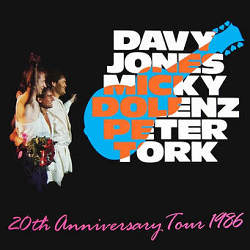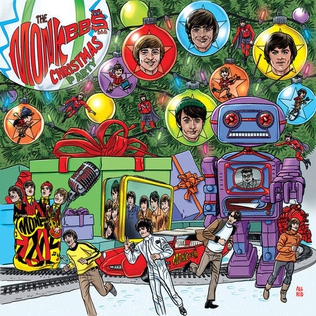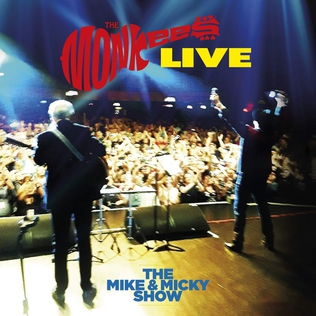
The Monkees were an American pop rock band formed in Los Angeles in the mid-1960s. The band consisted of Micky Dolenz, Davy Jones, Michael Nesmith, and Peter Tork. Spurred by the success of the television show of the same name, the Monkees were one of the most successful bands of the late 1960s. With international hits, four chart-topping albums and three chart-topping songs, they sold more than 75 million records worldwide.

Pisces, Aquarius, Capricorn & Jones Ltd. is the fourth album by the Monkees. It was released on November 6, 1967, during a period when the band exerted more control over their music and performed many of the instruments themselves. However, although the group had complete artistic control over the proceedings, they invited more outside contributions than on their previous album, Headquarters, and used session musicians to complement their sound. The album also featured one of the first uses of the Moog synthesizer in popular music. Pisces, Aquarius, Capricorn & Jones Ltd. sold over three million copies. It was the band's fourth consecutive album to reach No. 1 on the U.S. Billboard 200.

Headquarters is the third studio album by the American pop rock band the Monkees, released in 1967 by Colgems Records. It was issued after the first season of their television series had concluded and was the first album on which the group members made substantial songwriting and instrumental contributions, rather than relying on session musicians and professional songwriters. After a struggle for creative autonomy with their record label, the group had been allowed, to a degree, to record by themselves. Headquarters became the group's third consecutive No. 1 album on the Billboard 200 chart and was certified double platinum in the United States with sales of more than two million copies within the first two months of release. It also peaked at No. 2 on the UK charts. It is included in the 2006 book 1001 Albums You Must Hear Before You Die.

More of the Monkees is the second studio album by the American pop rock band the Monkees, released in 1967 on Colgems Records. It was recorded in late 1966 and displaced the band's debut album from the top of the Billboard 200 chart, remaining at No. 1 for 18 weeks, the longest run of any Monkees album. Combined, the first two Monkees albums were at the top of the Billboard chart for 31 consecutive weeks. More of the Monkees also went to No. 1 in the UK. In the U.S., it has been certified quintuple platinum by the RIAA, with sales of more than five million copies. More of the Monkees is also notable for being the first pop/rock album to be the best-selling album of the year in the U.S.

The Monkees is the debut studio album by the American band the Monkees. It was released on October 10, 1966 by Colgems Records in the United States and RCA Victor in the rest of the world. It was the first of four consecutive U.S. number one albums for the group, taking the top spot on the Billboard 200 for 13 weeks, after which it was displaced by the band's second album. It also topped the UK charts in 1967. The Monkees has been certified quintuple platinum by the RIAA, with sales of over five million copies.

Changes is the ninth studio album by the American pop rock band the Monkees, released in 1970 by Colgems Records. The album was issued after Michael Nesmith's exit from the band, leaving only Micky Dolenz and Davy Jones to fulfill the recording contract they had signed in the mid-1960s. Changes was their last new album for Colgems Records and the group's last album of all new material until Pool It!, released in 1987.

Pool It! is the tenth studio album by American pop rock band the Monkees, released in August 1987 by Rhino Records. It was the first Monkees studio album of new material since Changes in 1970 and the first Monkees album to feature Peter Tork since the 1968 Head soundtrack.

The Birds, the Bees & the Monkees is the fifth studio album by the American pop rock band the Monkees, released in 1968 by Colgems Records. It was the first album released after the cancellation of their TV show and subsequently was their first not to reach No. 1 on the U.S. Billboard 200, peaking at No. 3, and their first not to chart in the UK, with their four previous efforts all having reached the top ten. The album has sold over a million copies.

Head is the sixth studio album by the American pop rock band the Monkees, released in 1968 by Colgems Records, and the soundtrack to the film of the same name. The album primarily consists of musique concrète pieces assembled from the film's dialogue, while the six new songs encompass genres such as psychedelic music, lo-fi, acid rock and Broadway theatre.

Instant Replay is the seventh studio album by the American pop rock band the Monkees, released in 1969 by Colgems Records. Issued 11 months after the cancellation of the group's NBC television series, it is also the first album released after Peter Tork left the group and the only album of the original nine studio albums that does not include any songs featured in the TV show.

Missing Links Volume Three is a compilation album of rare and previously unreleased songs by the American pop rock band the Monkees, issued by Rhino Records in 1996. It is the third and final volume of a three-volume set, preceded by Missing Links in 1987 and Missing Links Volume Two in 1990.

"Pleasant Valley Sunday" is a song by Gerry Goffin and Carole King, recorded and released by the Monkees in the summer of 1967. Inspired by their move to West Orange, New Jersey, and named for a street there, Goffin and King wrote the song about their dissatisfaction with life in the suburbs.
Dolenz, Jones, Boyce & Hart was a supergroup, consisting of songwriting/performing duo Boyce and Hart and two members of the Monkees, Micky Dolenz and Davy Jones. Boyce and Hart had written many of the Monkees' biggest hits, such as "Last Train to Clarksville" and "(Theme From) The Monkees". The group existed only for a short time in 1976, recording one eponymous album.

Summer 1967: The Complete U.S. Concert Recordings is a four-CD compilation of live recordings by the American pop rock band the Monkees, released in 2001 by Rhino Handmade. Recorded during the band's summer 1967 tour, the CD was a limited edition release, with 3,500 copies being made available. 16 of these tracks had previously been compiled by Rhino and released as Live 1967 in 1987.

The Headquarters Sessions is a compilation album by the American pop rock band the Monkees, released in 2000 by Rhino Handmade. It contains 84 tracks on three CDs, including 60 previously unreleased recordings from the sessions that produced the band's third album, Headquarters (1967).

20th Anniversary Tour 1986 is a live album by the Monkees recorded during their 20th anniversary tour in 1986. To date, it is the only known complete concert recorded during this era. The recording was available at 1987 tour stops in double-LP and cassette formats, though a planned 1988 retail release by Rhino Records was ultimately scrapped. The record credited the artists as Davy Jones, Micky Dolenz, Peter Tork to avoid paying royalties to Arista Records who owned the Monkees trademark at the time, though the band's logo is visible on the sleeve. A limited-edition CD was released in 1994 under the title Live! by the group's fan club in Nashville, and was sold at concerts during their 1996 tour.

Good Times! is the twelfth studio album by American pop rock band the Monkees. Produced primarily by Adam Schlesinger, the album was recorded to commemorate the band's 50th anniversary. It is the first Monkees studio album since Justus (1996), marking the longest gap between releases to date, and the first since the death of Davy Jones. The album features surviving Monkees Micky Dolenz, Michael Nesmith, and Peter Tork, as well as a posthumous contribution from Jones.

Christmas Party is the 13th and final studio album by the American pop rock band the Monkees, released on October 12, 2018, by Rhino Records. Produced mainly by Adam Schlesinger, the album is the Monkees' first to focus on Christmas themes. It follows on the success of their 2016 album Good Times! The album features surviving Monkees Micky Dolenz, Mike Nesmith, and Peter Tork, as well as two posthumous contributions from Davy Jones. It is the final Monkees studio album to be released prior to Tork and Nesmith's deaths in 2019 and 2021, respectively.

The Monkees Live: The Mike and Micky Show is a 2020 live album by The Monkees, recorded in March and June 2019, during the band's successful tour. The concerts marked the first time that surviving Monkees Micky Dolenz and Michael Nesmith toured as a duo. The album is the first Monkees release following the death of Peter Tork in February 2019, and the final release to feature Nesmith prior to his December 2021 death.
"Words" is a song written by Tommy Boyce and Bobby Hart and released by the Monkees. An early version by the Leaves appeared on their 1966 album Hey Joe. The Monkees first recorded the song for their second album, More of The Monkees, in August 1966 under the supervision of Boyce and Hart. While this version went unreleased until the 1990 compilation Missing Links Volume Two, it was featured in the 10 April 1967 episode of The Monkees "Monkees, Manhattan Style". A new version of the song was made to be the B-side of "Pleasant Valley Sunday" in 1967, now produced by Chip Douglas.



















